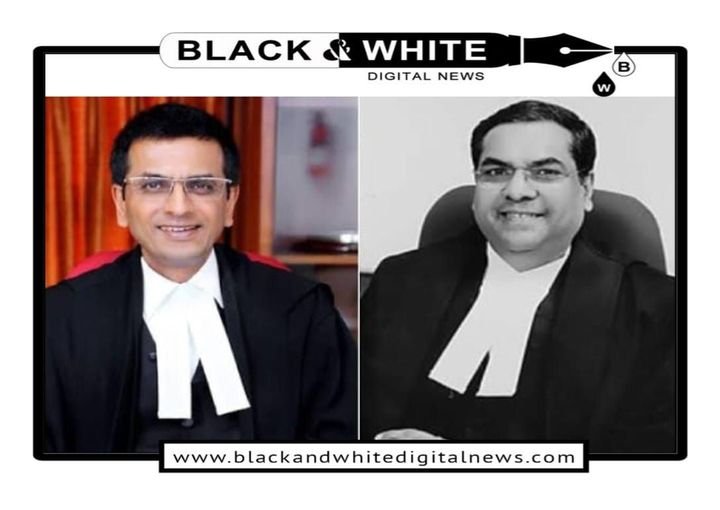Justice Khanna’s Ascent: New Chief Justice of India Embarks on Landmark Tenure.
||Black and White Digital News||
||November 12,2024 ||
New Delhi : In a moment of historic significance, Justice Sanjiv Khanna was sworn in as the 51st Chief Justice of India on Monday at Rashtrapati Bhavan, with President Droupadi Murmu administering the oath of office. The brief but solemn ceremony witnessed the presence of top dignitaries, including Prime Minister Narendra Modi, Vice-President Jagdeep Dhankhar, Defence Minister Rajnath Singh, Union Law Minister Arjun Ram Meghwal, and former Chief Justices D.Y. Chandrachud and J.S. Khehar. Justice Khanna, taking the oath in English and in the name of God, begins his role with the judiciary’s highest expectations resting on his shoulders.
Prime Minister Narendra Modi extended his best wishes to the new Chief Justice, writing on X, “Attended the oath-taking ceremony of Justice Sanjiv Khanna, who has been sworn in as the Chief Justice of the Supreme Court of India. My best wishes for his tenure.” Justice Khanna, with a career marked by landmark judgments, will serve a little over six months in this role, retiring on May 13, 2025, just a day before his 65th birthday. His predecessor, Justice D.Y. Chandrachud, demitted office the day before, on November 10, leaving a legacy of judicial reform and inclusion.
A Judicial Legacy and a Mission to Expedite Justice :
Born on May 14, 1960, Justice Khanna is a third-generation legal professional from a prominent Delhi-based family. He is the son of former Delhi High Court judge Justice Dev Raj Khanna and the nephew of the iconic Justice H.R. Khanna, celebrated for his dissent in the ADM Jabalpur case during the Emergency era. Justice H.R. Khanna’s ruling was instrumental in establishing the basic structure doctrine of the Constitution, a precedent that echoes today in defining judicial independence.
Justice Sanjiv Khanna’s journey began at Delhi University’s Campus Law Centre, from where he graduated in 1983. His legal career took root in Tis Hazari courts, later extending to the Delhi High Court, where he was recognized for his tenure as senior standing counsel for the Income Tax Department and standing counsel for the National Capital Territory of Delhi.
Championing Judicial Efficiency and Landmark Judgments :
Justice Khanna’s tenure on the Supreme Court bench since January 18, 2019, has seen him preside over multiple landmark cases. A staunch proponent of judicial efficiency, Justice Khanna is driven to reduce the judiciary’s massive caseload and speed up justice delivery, reflecting his belief in upholding both justice and administrative reform. His past rulings have solidified his legacy as a steadfast advocate for constitutional integrity.
Among his notable judgments, Justice Khanna played a pivotal role in affirming the use of Electronic Voting Machines (EVMs) as reliable and secure, rejecting calls to revert to paper ballots—a decision underscored by the bench he led in April, which dismissed “unfounded” suspicions of EVM manipulation. This stance reinforced the robustness of India’s electoral infrastructure amidst a polarized political climate.
Justice Khanna was also integral to the five-judge bench that ruled against the electoral bonds scheme for political funding, declaring it unconstitutional. This ruling underscored his commitment to transparency, further cementing his position as a watchdog for democracy.
In a landmark ruling that stirred national debate, Justice Khanna was part of the bench that upheld the abrogation of Article 370, supporting the Centre’s move to end Jammu and Kashmir’s special status. This decision marked a significant moment in Indian constitutional history, reflecting his judicious interpretation of federal powers and legislative sovereignty.
Another high-profile case saw Justice Khanna’s bench grant interim bail to former Delhi Chief Minister Arvind Kejriwal in the excise policy scam case, permitting him to campaign during the Lok Sabha elections—a move that underscored the court’s balanced approach to political and judicial interests.
A New Chapter for India’s Judiciary:
In his initial day as Chief Justice, Justice Khanna presided over Supreme Court proceedings alongside Justice Sanjay Kumar. As he commenced his duties, senior advocate and former Attorney General Mukul Rohatgi wished him a “fruitful tenure,” echoed by other senior lawyers. In a brief but heartfelt response, Justice Khanna expressed gratitude with a simple “Thank you,” signaling his readiness for the challenging road ahead.
The Congress party also conveyed its wishes through its President, Mallikarjun Kharge, who noted the immense “scrutiny and expectations” placed on the Chief Justice of India. “I am sure with his long and distinguished experience, he will be able to bear the weight of this responsibility and serve the judiciary with distinction,” Kharge posted on X, acknowledging Justice Khanna’s established legal acumen.
Justice Khanna’s influence extends beyond his court rulings. As the executive chairman of the National Legal Services Authority, he has championed initiatives to enhance legal accessibility, resonating with his goal of expediting justice. This leadership role has positioned him to effectuate meaningful change, which he brings to his tenure as Chief Justice.
An Oath of Accountability :
In an era where judicial independence and constitutional integrity are vigilantly observed, Justice Sanjiv Khanna’s ascent to Chief Justice is anticipated with high expectations and public scrutiny. Known for his dedication to legal principles and judicial expediency, Justice Khanna embodies a legacy steeped in India’s judicial history. As he steps into this role, he represents a bridge between the judiciary’s storied past and its evolving future, vowing to serve the nation with dedication and distinction.



